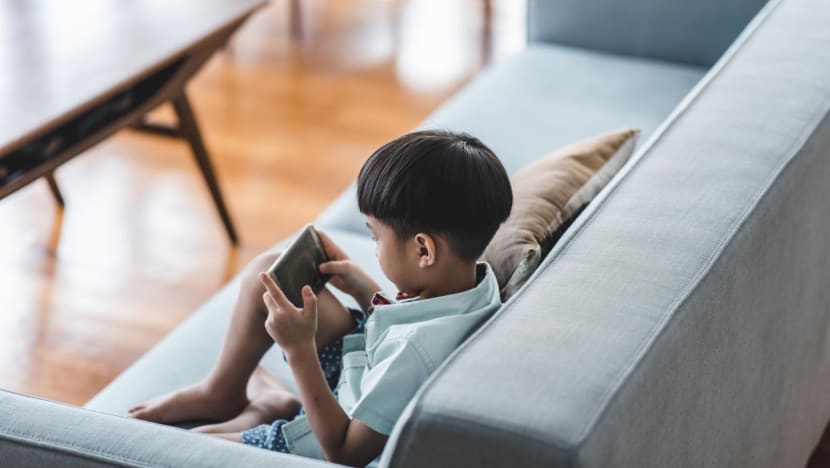Only 37% of parents in Singapore confident in guiding child's digital habits: MDDI survey
About 81 per cent of parents surveyed said they were worried about their children being exposed to inappropriate content, while more than half said they were concerned about cyberbullying.

A child using a phone. (File photo: iStock/AzmanJaka)
SINGAPORE: Only 37 per cent of parents in Singapore felt confident in their ability to guide their child’s digital habits, according to survey findings released by the Ministry of Digital Development and Information (MDDI) on Friday (Sep 12).
The remaining 63 per cent felt little or no confidence in their ability to do so.
"For parents who expressed little or no confidence, the main challenges cited were limited time due to work or other commitments, the child’s reluctance to follow rules, the child’s ability to bypass parental controls, and parents’ limited knowledge of parental controls or monitoring tools," said MDDI in a press release.
MDDI's survey on digital parenting was conducted in February to better understand how parents are managing their child’s digital activities, with the aim of informing the government how it can better support parents.
The survey was conducted online and valid responses were received from 1,986 Singapore residents with children aged two to 17.
Survey responses were weighted accordingly to ensure representativeness of Singapore's resident parent population in terms of age, gender or race.
Almost all the parents surveyed expressed concern about online harm or risk that their child may face while engaging in online activities.
Exposure to inappropriate content was the top concern, followed by interactions with strangers online and cyberbullying.
"Most parents acknowledged the need for them to play their part in guiding their child’s digital habits, with almost nine in 10 of them already taking at least one action, such as restricting usage duration or content types," said MDDI.
Prime Minister Lawrence Wong spoke about the impact of technology on young people in his 2025 National Day Rally speech.
He said that Singapore must make full use of technological developments. "But we must also be clear-eyed about the downsides, and manage them carefully. And that means striking the right balance.
"A balance between protecting our young from the potential harms. And equipping and empowering them to fully exploit the benefits of technology," he added.
He acknowledged in his speech that it was difficult for parents "to set boundaries, or even to know what their children are doing" online.
This was echoed by Minister for Digital Development and Information Josephine Teo on Friday.
“Parenting has always been challenging, and the digital age has introduced new complexities.
"Returning to a play-based childhood will take time and begins with reshaping norms in children’s digital habits," Mrs Teo said.
She added that by working with community partners, efforts can be strengthened and parents can be reassured that they are not alone, with support readily available.
SURVEY FINDINGS
MDDI's survey found that the use of digital devices by young children is "very high".
About 55 per cent of parents with children between two to four years old reported that their child owned or used someone else’s digital device.
Parents who had already allowed their child to use a device did so as early as when the child was three years old.
Among parents of children who owned or used digital devices, 94 per cent indicated that their child used the device for leisure activities, with media streaming and gaming being the most common activities.
Many children exceeded the Ministry of Health’s recommended daily screen time limits.
For children aged two to six, 58 per cent spent more than the recommended one hour on digital devices on weekdays, with 81 per cent doing so on weekends.
About 27 per cent of children aged seven to nine surpassed the recommended two hours on digital devices on weekdays, with the figure rising to 55 per cent on weekends.
For children in the 10 to 12 age group, 47 per cent used digital devices for more than the recommended two hours on weekdays, and 71 per cent did so on weekends.
MORE HELP WANTED
About 59 per cent of parents surveyed wanted more government support to help them manage their child’s digital activities.
Among those who were neutral or agreed that more support is needed, about 57 per cent wanted stronger legislation to protect children online, while 44 per cent wanted digital resources or guides.
"The government acknowledges these parental concerns and remains committed to strengthening legislation to better protect our children from online harms," said MDDI.
MDDI noted that the Infocomm Media Development Authority (IMDA) introduced in 2023 a code of practice that requires designated social media services to put in place systems and processes to prevent Singapore users, particularly children, from accessing harmful content.
In March, IMDA rolled out a code of practice for app stores to minimise the risk of exposure to harmful content for users, especially children.
The designated app stores are also to put in place age assurance measures to prevent young users under 18 from accessing age-inappropriate apps. These measures will be implemented by Mar 31, 2026.
A Bill will be tabled in parliament to establish a new online safety commission by the first half of 2026. The commission will enable victims to get help if they encounter online harms, and hold perpetrators accountable.
MDDI said the government will make resources more useful and accessible for parents, while improving community-based outreach. These include in-person programmes, such as workshops for parents.
"We will work with partners such as parent influencers to amplify and share bite-sized content through social media," said the ministry.
"We will also work with grassroots, industry and corporate partners to encourage more ground up initiatives and spark a whole-of-society effort to support parenting in the digital era."
Minister of State for Digital Development and Information Rahayu Mahzam said: “Over the years, we have built a sizeable pool of resources to support parents in the digital age through close partnerships with the people, private, and public sectors, particularly through the Digital for Life movement.
"However, fostering healthy digital habits among our young requires sustained and collective effort.
"We will continue working closely with organisations not only to co-create engaging and practical resources and programmes, but also make them more convenient and accessible for parents."
















